Imagine a future in which your company is tapping into the power of AI with ease, leveraging deep computer vision, natural language understanding, and machine learning. The reality is, that Amazon AI technologies are making this a reality today for businesses, not science fiction.
Amazon’s suite of AI tools is going to be the golden key, letting your business fly ahead in times when data is king. These technologies conversational AI to predictive analytics-completely revolutionize how businesses work and interact with customers, make decisions, and so on. With so many on offer, how will you sort out which ones suit your company best? Most importantly, how will they be applied?
In this blog, we will dive deep into the AI ecosystem of Amazon- from generic Amazon SageMaker to more specialized technologies such as Amazon Rekognition for machine vision and Amazon Lex for chatbots. From enhancing your text-to-speech capabilities using Amazon Polly to improving your predictions with Amazon Forecast, we will be able to help you with whatever your goal is. Get ready to unleash the power of AI and transform your business using the state-of-the-art resources provided by Amazon.
What are Amazon’s Artificial Intelligence Tools?
Amazon Web Services, or AWS, has a suite of machine learning and artificial intelligence services that are called Amazon AI tools. They are designed to enable companies and developers to easily integrate AI solutions into their workflows and applications. These solutions leverage the latest technology in data analytics, picture identification, and natural language processing to support decision-making, automate processes, and improve user experience.
Overview of Amazon AI Tools
A. Meaning and importance
Amazon AI tools consist of machine learning and artificial intelligence services. AWS is one of the various providers of the mentioned service solutions that allow an organization to add state-of-the-art AI capabilities to applications and workflows with minimal data science or machine learning knowledge.
Importance: the potentiality to democratize AI technologies;
- Boost innovation
- Increase decision-making quality
- Create a rich customer experience
- Optimize your business operation
B. Key benefits for businesses
Amazon AI tools offer numerous advantages for organizations across various industries:
| Benefit | Description |
|---|---|
| Cost-effectiveness | Pay-as-you-go pricing model reduces upfront investments |
| Scalability | Easily scale AI capabilities as business needs grow |
| Time-to-market | Rapid deployment of AI solutions without building from scratch |
| Accessibility | User-friendly interfaces for both technical and non-technical users |
| Continuous improvement | Regular updates and new features to stay competitive |
C. AWS Integration
Amazon AI services integrate with the greater AWS environment in a variety of ways to facilitate many advantages to the user.
- Ease of Data Transfer Between Different AWS Products and the AI Services
- Integrated Compliance and Security
- Simplification of Resource Management and Billing
- Access to a Large Repository of Further Services
With this connectivity, companies can create comprehensive, end-to-end AI solutions with complete leverage of AWS services and infrastructure. After reviewing Amazon AI tools, let’s look at one of the most flexible: Amazon SageMaker is a full-featured machine learning platform.
1. Amazon SageMaker: Comprehensive Machine Learning Platform
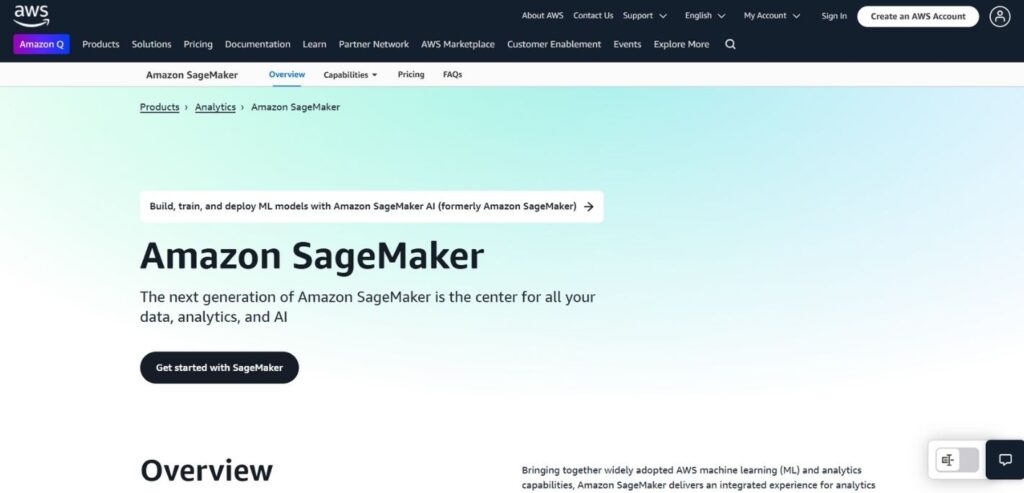
Built-in algorithms and frameworks
Amazon SageMaker offers a wide array of built-in algorithms and frameworks, making it easier for data scientists and developers to build, train, and deploy machine learning models quickly. These pre-configured options cover various use cases, from computer vision to natural language processing.
Here’s a list of some popular built-in algorithms and frameworks available in SageMaker:
- XGBoost
- Linear Learner
- Random Cut Forest
- DeepAR Forecasting
- Object Detection
- Image Classification
- Semantic Segmentation
SageMaker also supports popular deep learning frameworks such as TensorFlow, PyTorch, and MXNet, allowing developers to work with their preferred tools.
Automated model training and tuning
One of SageMaker’s key features is its ability to automate the model training and tuning process. This automation significantly reduces the time and effort required to develop high-performance machine learning models.
| Feature | Description |
|---|---|
| Automatic Model Tuning | Finds the best hyperparameters for your model |
| Managed Spot Training | Reduces training costs by up to 90% |
| Distributed Training | Scales training across multiple GPUs and machines |
| Experiment Tracking | Organizes, tracks, and compares machine learning experiments |
Scalable deployment options
SageMaker provides flexible deployment options to suit various application needs. Whether you’re deploying models for real-time inference or batch processing, SageMaker has you covered.
- Real-time inference endpoints
- Serverless inference
- Batch transform jobs
- Multi-model endpoints
These options ensure that you can deploy your models efficiently and cost-effectively, regardless of your application’s scale or requirements.
Cost-effective pricing model
Amazon SageMaker’s pricing model is designed to be cost-effective and flexible, allowing businesses of all sizes to leverage its powerful machine-learning capabilities. The pay-as-you-go model ensures that you only pay for the resources you use, making it an attractive option for both small startups and large enterprises.
Now that we’ve explored Amazon SageMaker’s comprehensive features, let’s move on to another powerful AI tool in Amazon’s arsenal: Amazon Rekognition.
2. Amazon Rekognition: Computer Vision Made Easy
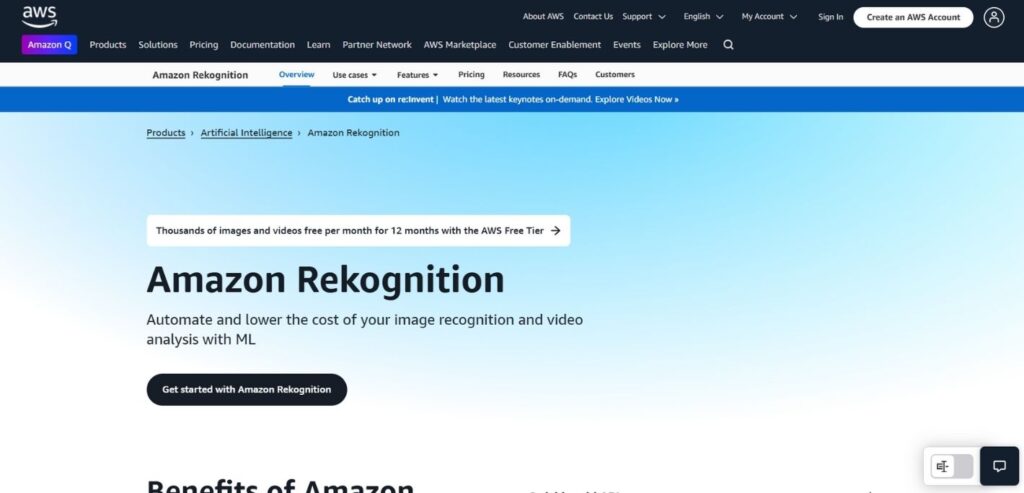
Image and video analysis capabilities
Amazon Rekognition offers powerful image and video analysis capabilities, enabling businesses to extract valuable insights from visual data. This AI-powered service can detect objects, scenes, activities, and even emotions in both static images and video content.
Key features:
- Object and scene detection
- Activity recognition
- Facial analysis
- Celebrity recognition
- Text extraction
| Feature | Image Analysis | Video Analysis |
|---|---|---|
| Object Detection | ✓ | ✓ |
| Facial Analysis | ✓ | ✓ |
| Text Extraction | ✓ | ✓ |
| Activity Recognition | ✗ | ✓ |
| Celebrity Recognition | ✓ | ✓ |
Facial recognition and comparison
Rekognition’s facial recognition technology allows for accurate identification and comparison of faces across large datasets. This feature has numerous applications, from security and access control to personalized customer experiences.
- Face detection and analysis
- Face comparison and matching
- Facial attribute detection (age, gender, emotions)
Text detection in images
With its advanced OCR capabilities, Rekognition can detect and extract text from images, making it invaluable for document processing and content analysis tasks.
Content moderation features
Rekognition’s content moderation tools help businesses maintain brand safety and compliance by automatically detecting inappropriate or offensive content in images and videos.
- Inappropriate content detection
- Violence and weapon detection
- Nudity and suggestive content filtering
These features make Amazon Rekognition a versatile tool for businesses looking to leverage computer vision in their operations. Next, we’ll explore Amazon Lex, a powerful solution for building conversational AI interfaces.
3. Amazon Lex: Conversational AI for Chatbots

Natural language understanding
Amazon Lex leverages advanced natural language understanding (NLU) capabilities to interpret user intent and extract relevant information from conversations. This powerful feature enables chatbots to comprehend complex user queries and respond accurately, enhancing the overall user experience.
Key benefits of Lex’s NLU:
- Accurate intent recognition
- Entity extraction
- Contextual understanding
- Handling of variations in language
Easy bot creation and deployment
Creating and deploying chatbots with Amazon Lex is a seamless process, making it accessible to both developers and non-technical users. The platform offers intuitive tools and a user-friendly interface for building conversational interfaces.
| Feature | Description |
|---|---|
| Visual designer | Drag-and-drop interface for bot creation |
| Pre-built intents | Ready-to-use templates for common scenarios |
| Testing console | Built-in environment for bot testing |
| One-click deployment | Easy publishing to multiple channels |
Integration with popular messaging platforms
Amazon Lex seamlessly integrates with various messaging platforms, allowing businesses to reach customers through their preferred communication channels. This flexibility ensures a wider reach and improved customer engagement.
Scalability and multi-language support
Lex offers robust scalability to handle varying workloads and supports multiple languages, making it ideal for global businesses. This capability allows companies to create chatbots that can communicate effectively with users worldwide, breaking down language barriers and expanding market reach.
Now that we’ve explored Amazon Lex’s capabilities for building conversational AI, let’s move on to another powerful tool in Amazon’s AI arsenal: Amazon Polly, which brings text-to-speech functionality to life.
4. Amazon Polly: Text-to-Speech Solution
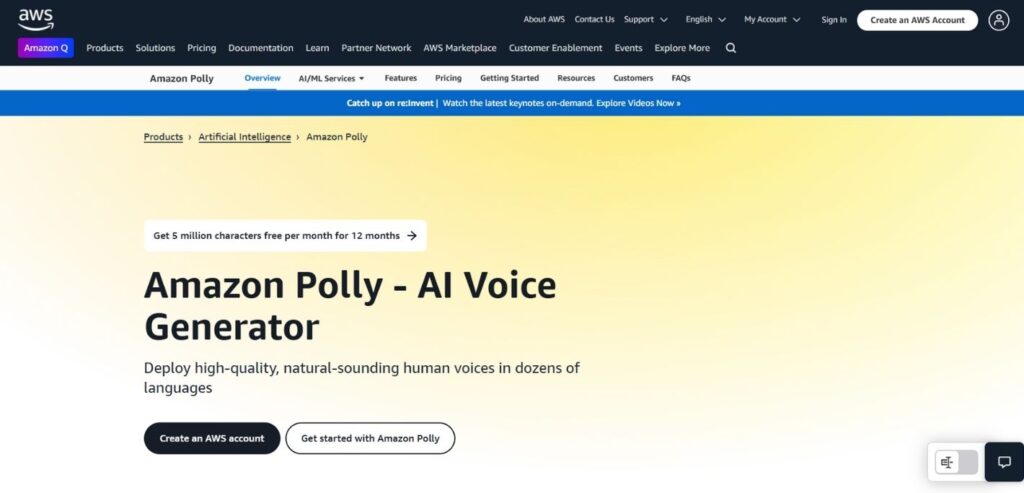
Natural-sounding voices
Amazon Polly offers an impressive array of lifelike voices that bring the text to life with remarkable authenticity. These voices are designed to sound natural and engaging, making them suitable for a wide range of applications. Here’s a comparison of some popular Amazon Polly voices:
| Voice | Language | Gender | Use Case |
|---|---|---|---|
| Joanna | US English | Female | General purpose, news reading |
| Matthew | US English | Male | Audiobooks, narration |
| Vicki | German | Female | E-learning, virtual assistants |
| Takumi | Japanese | Male | Gaming, entertainment |
Support for multiple languages and accents
Amazon Polly’s multilingual capabilities are truly impressive, supporting over 60 voices across 29 languages. This diversity allows businesses to cater to a global audience effectively. Some key features include:
- Regional accents within languages (e.g., US, UK, and Australian English)
- Male and female voices in most languages
- Support for less common languages like Welsh and Icelandic
SSML tags for customization
Speech Synthesis Markup Language (SSML) tags provide fine-grained control over voice output:
- Adjust speaking rate and pitch
- Add pauses and emphasis
- Insert custom pronunciations
- Control volume and intonation
Real-time audio streaming
Amazon Polly’s real-time streaming feature enables:
- Immediate playback of generated speech
- Reduced latency for interactive applications
- Seamless integration with live broadcasting systems
Now that we’ve explored Amazon Polly’s text-to-speech capabilities, let’s move on to Amazon Comprehend, which focuses on natural language processing tasks.
5. Amazon Comprehend: Natural Language Processing
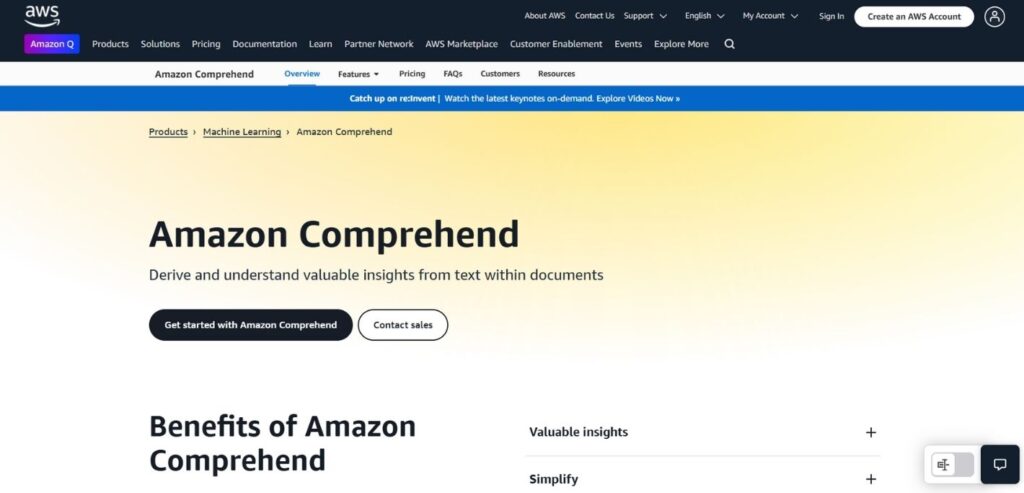
Entity recognition and keyphrase extraction
Amazon Comprehend’s entity recognition and key phrase extraction capabilities are powerful tools for understanding and analyzing text data. These features help businesses extract valuable insights from large volumes of unstructured text, such as customer reviews, social media posts, and support tickets.
Entity Recognition
Entity recognition identifies and categorizes named entities within text, such as:
- People
- Organizations
- Locations
- Dates
- Quantities
This feature enables businesses to quickly identify important information and relationships within their text data.
Key Phrase Extraction
Key phrase extraction identifies the most important words and phrases in a piece of text, helping to summarize content and highlight main topics. This is particularly useful for:
- Content categorization
- Search engine optimization
- Summarization of long documents
| Feature | Use Case | Benefits |
|---|---|---|
| Entity Recognition | Customer feedback analysis | Identify product names, features, and competitors |
| Key Phrase Extraction | Content marketing | Optimize blog posts and articles for SEO |
Sentiment analysis
Sentiment analysis is a crucial aspect of Amazon Comprehend, allowing businesses to gauge the emotional tone of text data. This feature can determine whether a piece of text expresses positive, negative, or neutral sentiments, providing valuable insights into customer opinions and experiences.
Applications of Sentiment Analysis
- Brand monitoring
- Customer feedback analysis
- Social media listening
- Product reviews evaluation
By leveraging sentiment analysis, companies can make data-driven decisions to improve their products, services, and overall customer experience.
Language detection
Amazon Comprehend’s language detection feature automatically identifies the dominant language of a text document. This capability is essential for businesses operating in multilingual environments or dealing with diverse customer bases.
Benefits of Language Detection
- Streamline content routing and translation processes
- Improve customer support by directing queries to appropriate language teams
- Enhance content personalization based on user language preferences
Custom classification models
While Amazon Comprehend offers pre-built models for various NLP tasks, its custom classification feature allows businesses to create tailored models for specific use cases. This flexibility enables organizations to classify text data according to their unique needs and industry-specific terminology.
Steps to Create Custom Classification Models
- Prepare labeled training data
- Upload data to Amazon S3
- Train the model using Amazon Comprehend
- Evaluate and refine the model
- Deploy the model for real-time or batch inference
Custom classification models can be particularly valuable for industries with specialized vocabularies or unique categorization requirements, such as healthcare, finance, or legal services.
6. Amazon Forecast: Time Series Forecasting
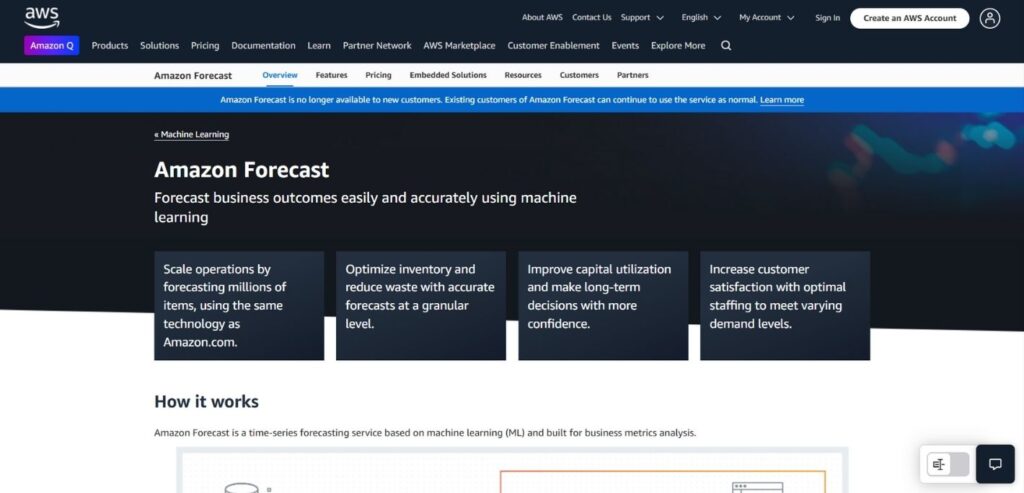
A. Accurate demand forecasting
Amazon Forecast excels in providing precise demand forecasting, enabling businesses to anticipate future trends and customer behavior. By leveraging advanced machine learning algorithms, this tool analyzes historical data and external factors to generate accurate predictions.
Key benefits of Amazon Forecast for demand forecasting:
- Improved inventory management
- Optimized resource allocation
- Enhanced customer satisfaction
- Reduced operational costs
| Feature | Benefit |
|---|---|
| AutoML | Automatically selects the best algorithm |
| Scalability | Handles large datasets efficiently |
| Integration | Seamlessly connects with existing systems |
| Customization | Adapts to specific business needs |
B. Inventory optimization
With Amazon Forecast, businesses can optimize their inventory levels, striking the perfect balance between overstocking and stockouts. This AI-powered tool helps companies maintain optimal stock levels, reducing carrying costs while ensuring product availability.
C. Financial planning assistance
Amazon Forecast provides invaluable support for financial planning by offering accurate revenue projections and cost estimates. This enables businesses to make informed decisions regarding budgeting, investments, and resource allocation.
D. Customizable models for specific use cases
One of the standout features of Amazon Forecast is its ability to adapt to various industries and use cases. Whether you’re in retail, manufacturing, or finance, the tool can be tailored to meet your specific forecasting needs.
Now that we’ve explored the powerful capabilities of Amazon Forecast, let’s examine how businesses can implement these Amazon AI tools to drive growth and efficiency.
Implementing Amazon AI Tools in Your Business
Assessing your AI needs
Before diving into Amazon’s AI tools, it’s crucial to evaluate your business requirements. Start by identifying pain points and areas where AI can drive efficiency or innovation. Consider the following aspects:
- Data availability and quality
- Desired outcomes and objectives
- Budget constraints
- Technical expertise within your team
Creating a prioritized list of AI use cases can help you focus on the most impactful initiatives.
Choosing the right tools for your goals
Once you’ve assessed your needs, match them with Amazon’s AI offerings:
| AI Need | Amazon Tool |
|---|---|
| Machine Learning | SageMaker |
| Image/Video Analysis | Rekognition |
| Chatbots | Lex |
| Text-to-Speech | Polly |
| Natural Language Processing | Comprehend |
| Predictive Analytics | Forecast |
Consider starting with a pilot project to test the waters and gain experience.
Best practices for integration
To ensure successful implementation:
- Start small and scale gradually
- Invest in employee training
- Establish clear governance and ethics policies
- Ensure data security and compliance
- Collaborate with IT and business units
Measuring ROI and performance
Track key performance indicators (KPIs) to gauge the success of your AI initiatives:
- Cost savings
- Productivity improvements
- Customer satisfaction scores
- Revenue growth
Regularly review and adjust your AI strategy based on these metrics. Remember, AI implementation is an iterative process that requires continuous refinement and optimization.
Conclusion
Amazon currently has a broad portfolio of AI technologies for those companies wishing to exploit the power of artificial intelligence. These powerful capabilities may be poised to alter many facets of your business, everything from forecasting to natural language processing, machine learning, and computer vision.SageMaker, Rekognition, Lex, Polly, Comprehend, and Forecast are some of the services it proposes that will bring insight, improve customer experiences, and automate business processes when harnessed by businesses.
Remember, proper utilization of use cases and alignment to strategic goals are what make the effective absorption of Amazon AI capabilities into any organization. Thus, start very small and with increasing confidence scale up your artificial intelligence projects by degrees. So, when leveraging the powerful AI Ecosystem at Amazon, you become able to achieve innovation, drive efficiency, as well as keep a competitive advantage by being able to navigate through digital change.

